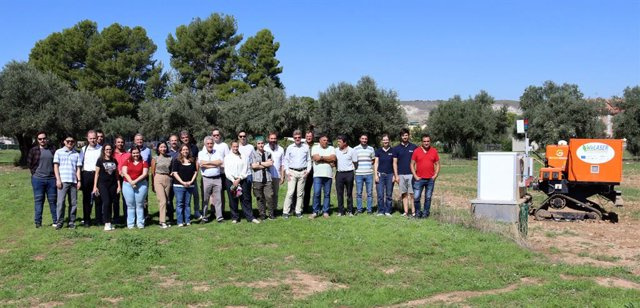(Information sent by the signatory company)
MADRID, December 18, 2023 /PRNewswire/ -- After 3 years of work, an international consortium of 10 entities from 8 EU member countries has created a precision weeding tool that demonstrates that herbicide-free agriculture is on the way. arm's reach.
This consortium made up of research centers, universities, private companies and farmers' organizations from Spain, Germany, Denmark, France, Poland, Belgium, Italy and the Netherlands, and financed by the EU within its "Horizon 2020" program, has finalized the first stage of the development of the WeLASER prototype, a precision weeding tool that will allow progress in the eradication of the use of herbicides, improving the productivity and competitiveness of crops, thus eliminating health risks and the adverse environmental effects of chemicals .
The prototype includes an autonomous vehicle that moves through the crop and is equipped with an advanced detection system based on artificial intelligence (AI) through image acquisition and data processing, which allows it to distinguish and locate the growth center of the disease. grass to eradicate. Once located through the scanner, direct the high-power fiber laser source towards said meristem. This rapid modulation concept allows precise energy pulses to be directed for highly efficient weed treatment. Data management is managed using a cloud computing architecture and the system includes IoT technology.
Although this project is currently concluding this first phase of development, further work will be needed, for example, to reduce the time required to work in the field, make the prototype easier to handle and connect, and reduce production costs to be able to achieve a marketable model in the market.
A project of maximum cooperation between entities from all over Europe
WeLASER is the result of the cooperation of 10 entities from 8 EU member states. On the part of Spain, the Center for Automation and Robotics (CAR) belonging to the Higher Council for Scientific Research (CSIC) and coordinator of the project and the Coordinator of Farmers and Livestock Organizations (COAG); on the part of Germany, the Laser Zentrum Hannover eV (LZH) and the company Futonics Laser GmbH (FUT); in the case of Denmark, the Department of Plant and Environmental Sciences at the University of Copenhagen (CPH); from France, the company AgreenCulture (AGC); from Italy, the Interdepartmental Center for Agri-Food Industrial Research of the University of Bologna (UNIBO); from Poland, the Instytut Ecología Terenów Uprzemysłowionych (Institute of Ecology of Industrial Areas) (IETU) in Katowice; from Belgium, the Department of Agricultural Economics of the Faculty of Biosciences Engineering of Ghent University and from the Netherlands (UGENT), Van Den Borne Projecten BV, the innovation department of Van Den Borne Aardappelen (VDBP) farm located in Reusel .
For Pablo González de Santos, from the CSIC Center for Automation and Robotics, coordinator of the project, "WeLASER has been a perfect collaboration between leading organizations in each of their fields of work, which has made it possible to have the latest technologies and advances available. necessary for the development of such a cutting-edge and necessary project".
Beyond the development of the prototype, this project has resulted in the development of different innovations with multiple applications such as the high-power fiber laser source for the control of weeds through precise energy pulses, with an innovative pump concept. and cooling that minimizes laser energy demand for the weeding process; an improved power system for autonomous robotic platforms; an intelligent navigation manager for autonomous robots applicable to precision agriculture that allows navigation throughout the entire farm, not limiting it exclusively to the crop field and that integrates different Artificial Intelligence (AI) methodologies to identify various types of crops, including crops wide and narrow; and an AI-based laser weed control implement that allows a wide range of work for the individualized treatment of plants in crops of different types, complying with all the safety regulations required by working with laser technology.
Ensure food production on a safe planet
Faced with an ever-increasing population in an environment of climate change like the one we live in, the great challenge for humanity is how to guarantee food production without damaging the environment or the health of the population with production systems that are increasingly efficient and less polluting.
In Europe alone, around 130 million tons of synthetic herbicides are used each year (not counting other chemicals), substances that, when applied, do not discriminate between beneficial plants and soil insects that are not their target and that, furthermore, They can produce effects on the health of animals and humans.
Additionally, weeds are developing resistance, meaning existing herbicides are becoming less effective.
For González de Santos, "The WeLASER consortium is motivated to adopt smarter agricultural methods and build more sustainable food production systems while preserving the environment and health. WeLASER opens a reliable and safe option and offers advances to solve a global problem" .
ADDITIONAL INFORMATION Download images Download video Download logos Press dossier Press release in German, English, Italian, Polish, French and Dutch
Photo - https://mma.prnewswire.com/media/2302240...
View original content: https://www.prnewswire.com/news-releases/welaser-mas-cerca-de-una-agricultura-sin-plaguicidas-302017030.html













